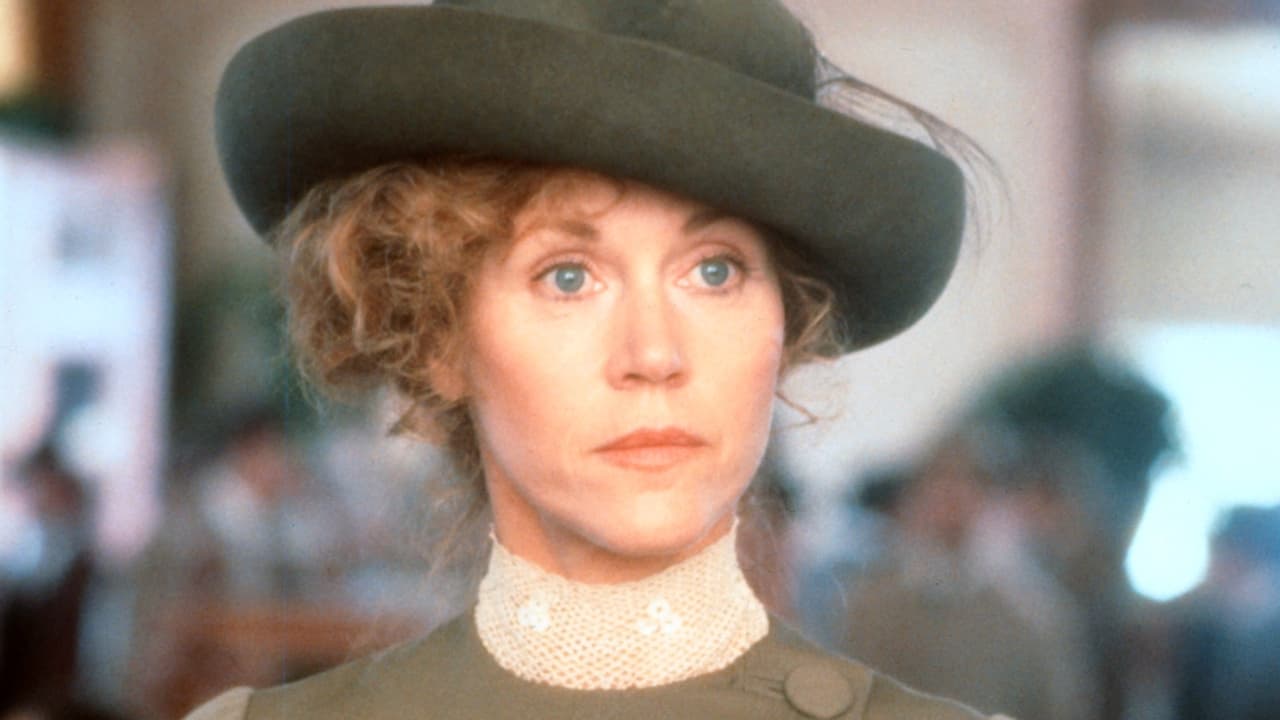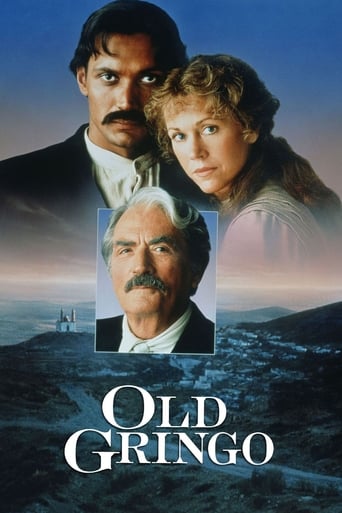

The main reason to watch this film is the absolutely mesmerizing performance of Gregory Peck. Aged 73 at the time of filming, his deep voice resonates and rumbles out of the screen magnificently, punctuated with heavy breathing, completely dominating the screen whenever he speaks. There is a scene in which he woos Jane Fonda as they sit on a log; it is hard to imagine any woman not falling for the aging Peck as his words pour forth to her like poetry. This is the voice I imagine God speaks with.Peck's character is world-weary, and he engages everyone around him with detachment and some irony; except, watch for the scene towards the end in which he takes General Arroyo's black horse out for a ride in the country. The pure joy on Peck's face is delightful, genuine and pleasing to see.And speaking of the horse: one of the most spectacular and shocking animal moments in screen history has to be the shot of General Arroyo shooting his horse in the head, near the end of the film. The timing of the sprawling horse is flawless, the effect electrifying.Jimmy Smits is excellent as General Arroyo, and it is interesting how the general becomes more sympathetic as the movie moves along.Sadly, though, the parts don't come together to make a great whole. Yes, "Old Gringo" is beautifully filmed, but it goes on for too long, and furthermore, it is tiring to have to work out, through the first half-hour, who is fighting for which side, and who are the Mirandas.Worst of all is the presence of Jane Fonda. She's not bad, but look: if you want to look skinny, hang around fat people. If you don't want people to notice that your acting is wooden and uninspiring, don't appear in a movie with Gregory Peck. I think an actress like Kate Capshaw (who plays a similar character in the 1987 TV-movie version of "The Quick and the Dead") would have played Ms. Winslow much more appealingly.A final question: is Peck already dead when he is "executed" at the movie's end? His eyes are first looking at Arroyo, then moments later facing forward at the executioners. Hard to say."Old Gringo" is worth watching to see Gregory Peck still eat up the screen in this, the winter of his career; but have the fast-forward ready.
... View MoreMix a sexually repressed teacher(Fonda),a fiery revolutionary(Smits), and a dying author(Peck) with hundreds of Mexican extras, mariachi's, romance, pretty photography and you've got Old Stinko: a boring, lackluster cliché ridden waste of time for all involved. Essentially, it's The Rainmaker(56) set against the background of the Mexican Revolution. This misbegotten project lacks a purpose for being and never really involves the audience. Smits is cliché but less ridiculous than the other 2 characters who suck the life out of the movie and get in the way of the background which while pretty and pleasing to the eye is too pretty and overblown for the sketchy story being told. Peck plays Ambrose Bierce like Atticus Finch, and the scenes between he and Fonda recall Atticus and Scout in To Kill a Mockingbird. As the wide eyed pupil/teacher Fonda is unconvincing and embarrassing, and Peck is a hollow bore. The people involved in this project should have asked themselves Why will audiences care? They didn't, and the film was a box office and critical disappointment. Just ignore it, and it will go away.
... View MoreAt one level, this film focuses on a much delayed coming of age adventure for Jane Fonda's character, Harriet Winslow, who suddenly decides she has had enough of her mother-dominated spinster school marm life. Yes, we would expect her to be maybe 10-20 years younger than her 50 years, and some have suggested she was thus miscast. However, her relatively advanced age makes her crush on Peck's 70 year old character, Ambrose Bierce, more believable. Peck's characterization of Bierce is somewhat at odds with what I have read of this man. We get the impression that, like Harriet, he has decided to forsake his bookish life, as a sick old man, for a final hands-on adventure, as an aid to the rebels in the Mexican revolution. However, the real Bierce fought in the Civil War and later crossed the continent on another assignment. He was not a one-dimensional bookish writer, by experience.Fonda simultaneously develops a crush on both Bierce and General Arroyo(Jimmy Smits). They are both seen as romantic rebels, though of very different sorts and for different personal reasons. Harriet reminds Bierce of his daughter, whom he hasn't seen for many years, while Bierce reminds Harriet of her father, who abandoned his domineering wife for a new love, and who fought in the Spanish American war to help free Cuba. But after partially destroying the Miranda mansion where he was conceived, Arroyo delays taking his troops to join Villa's, as ordered. Arroyo's bedding of Harriet on the very bed where he was conceived symbolically reverses the power relationship in which his European father raped his native American mother. He finds the original Spanish land grant papers giving the land of this hacienda to the peasants. Since Spain no longer governed Mexico, these papers were not necessarily valid, as Pierce points out, but Arroyo refuses to heed. Arroyo's shooting of his favorite horse and of Bierce reinforces his determination to stay at the hacienda of his birth instead of joining Villa.There are several references accusing Arroyo of having become the new Miranda, and thus betraying the revolution. I don't understand why Arroyo had one of his soldiers shot for doing what he himself was doing. He must have known he would receive the same sentence if he did not soon join Villa's forces. Perhaps this symbolized the near universal tendency of revolutionary leaders to gradually become tyrants as bad or worse than those they topple. So it had been with Porfirio Diaz, the once revolutionary general the revolutionists now fought against. So it would be with various successors to Diaz during these turbulent times.This is an entertaining film, for the most part. There are enough action scenes to complement the philosophizing and other tamer scenes. You will have to pay close attention or see it several times to dig out all the symbolism. I can see why this film was important to Jane Fonda. It is, in a sense, autobiographical, symbolizing her mid-life transformation from an apolitical sex kitten into an anti-establishment political spokeswoman for the powerless of the world.
... View MoreIn 1913, Harriet Winslow (Jane Fonda) is hired by a Mexican family as a governess, but she then is kidnapped by Gen Tomas Arroyo (Jimmy Smits) and along with other revolutionaries. She also meets Ambrose Bierce (Gregory Peck), who conceals his true identity and who is ready to die on this foreign land. The three of them form a love triangle, Harriet becomes Tomas's lover and her affection towards Bierce is rather like a daughter to a father. But when Tomas invades the house of Miranda, where his birth father, the master, rapes his mother and where his shoots Mr Miranda dead when he is seventeen, he becomes so haunted by his past and obsessed with the old papers. As he befriends Bierce, he also turns into a ruthless commander. In the end, things get tragic- Harriet is determined to fulfill Bierce' dying wish of not being publicised and Tomas has to face his ultimate punishment. Harriet now is the sole survivor who remembers her two beloved men. 'He said I would forget. But how could I not remember?'I really like this film. Jimmy Smits is excellent as the tormented general and Gregory Peck was marvellous as the disillusioned writer and journalist. Jane Fonda is not too bad. The direction is okay, the story is very poignant and twisted. All in all, a nicely done drama.
... View More